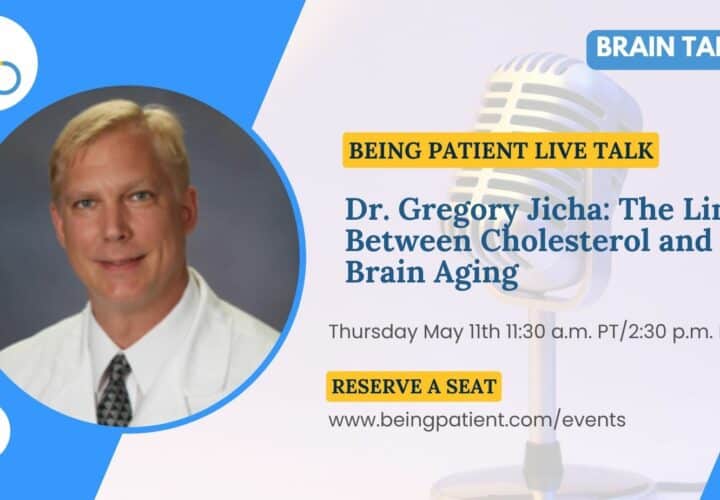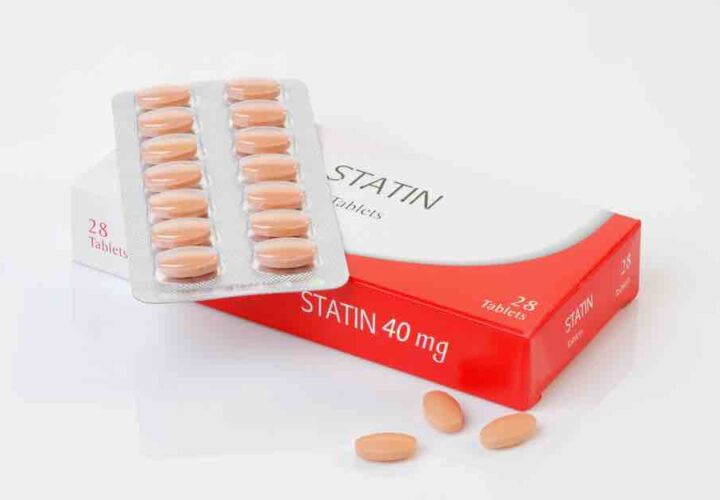Neurologist Gregory Jicha at the University of Kentucky explains the role of cholesterol in brain health and shares insights into how certain cholesterol meds could be key to preventing dementia.
Cardiovascular health and brain health go hand in hand. For instance: studies show that having a stroke doubles the chance a person will develop dementia, and people that keep heart-healthy medical advice in mind have up to a 70-percent lower risk of dementia. And, many diets linked to Alzheimer’s prevention, like the Mediterranean diet and the MIND diet, are also designed to prevent stroke and cardiovascular disease. Recent studies have also found that statins and other cholesterol-focused medications could prevent Alzheimer’s. All of this considered, the scientific community is putting an increasing amount of attention into investigating the specific relationship between cholesterol and brain health. Dr. Gregory Jicha, a neurology professor at the University of Kentucky, is one of the scientists drilling down on this link.
Specializing in Alzheimer’s and dementia treatment, Jicha is currently researching the impact cholesterol has on the brain with the University of Kentucky Sanders-Brown Center on Aging. One of his focuses has been studies on how gemfibrozil, a medication to get high cholesterol levels in check, may also be able to treat dementia.
Being Patient EIC Deborah Kan sat down with Jicha to learn more about the link between cholesterol and brain health, the potential of cholesterol meds to treat dementia, and other insights from his research. Watch the full talk, or find a transcript of the conversation below.
Being Patient: What should we keep in mind with our cholesterol levels?
Dr. Gregory Jicha: Let me take it back even one step further and say, what the heck is cholesterol? And why the heck do we have it? And why is it essential for the brain to have the right levels of concentration? It’s really important. Every cell in the body, especially the nerve cells in the brain, has a coating around them, a membrane that holds the cell together. That membrane is made out of different kinds of fats, the fats in our diet.
So, if those membranes were made out of pure saturated fat, our nerve cells would congeal, like bacon grease in a pan, so instead, we need the unsaturated fats that make that membrane smooth so that nerve cells can reach out and form new connections. There are parts of the membrane that have to be a little stiffer to hold things together, and cholesterol plays a vital role there mixing with those fats to make sure that nerve cells can be dynamic, so we can learn new things when we need to learn new things, but also, not just a complete blob.
Being Patient: For saturated and unsaturated fats, what do we need to keep in mind regarding brain health?
Jicha: We really should be going for the unsaturated fats. If we think of saturated fats, they’re so saturated and full of fattiness that they congeal like bacon. But the unsaturated, polyunsaturated fatty acids, which is what we see in olive and fish oil, these oils that are good and healthy for the brain. These fats allow the brain to have the fluidity needed to be balanced with an appropriate amount of cholesterol.
Healthy lifestyles can help regulate cholesterol, but a lot of the fats really come from our diets, so the best way to regulate your cholesterol health, fat health, and brain health is really to modify the diet. That’s where you’re going to be most effective. So, that’s why we see things like recommendations for the Mediterranean or the Mind diet. When we talk about the Mediterranean diet, we’re not talking about falafel and couscous, right? We’re talking about a diet that’s rich in vegetables and olive oils rather than saturated fatty oils. We also see nuts, fish, and things that are brain healthy in general. And a lot of that does indeed have to do with the fat content and the different types of fats and cholesterol found in those foods.
“Unsaturated fats…allow the brain to have that fluidity that it needs, balanced with an appropriate amount of cholesterol.”
Being Patient: What is the direct link between Alzheimer’s disease and cholesterol?
Jicha: We’ve long known that cholesterol is important for heart disease and for the risk of stroke. So, that’s really kind of where the cholesterol story started. We began to look at patient populations in the world that come down with dementia or those that may be at lower risk for dementia. Looking at those factors cholesterol is one of them. It pops up in those studies that people that have maintained good cholesterol over time seem to have a lower risk of dementia.
Now, that’s a pure observation, they may be doing other things that are quite healthy as well. But it’s a strong enough observation for us to understand. A lot of the new thinking is, if it’s good for your heart, it’s good for your brain. That’s a simple way for us to remember: things like cholesterol and exercise that prevent heart disease also prevent wear and tear on the brain.
Being Patient: Do we know, biologically speaking, what is happening inside our bodies to our brains if we do tend to have higher cholesterol?
Jicha: For the cholesterol trafficking in the brain, as we spoke about earlier, we need the right amount of the right cholesterol. It is carried by different cholesterol transporters, which are little like shuttles that move the cholesterol back and forth. Some of those cholesterol shuttles are actually genetic risk factors for Alzheimer’s disease. One that many people may have heard about is called ApoE or Apolipoprotein E, and it’s a cholesterol-trafficking protein. Mutations in this that prevent the appropriate cholesterol shuttling clearly lead to a massive increase in risk for Alzheimer’s disease.
“It pops up in those studies that people
that have maintained good cholesterol over
time seem to have a lower risk of dementia.”
So, there’s indeed some direct evidence ApoE, along with bad cholesterol, influences a risk not just for Alzheimer’s but a biochemical risk for the development of the amyloid plaques that build up in the brain of someone with Alzheimer’s disease. Much of this comes from scientific experiments in the laboratory experiments with animal models of disease, but the human data seems to parallel that.
Being Patient: Regarding blood tests, what’s the difference between LDL and HDL?
Jicha: This goes back to the age-old debates in medicine over which is better and which is worse. We typically consider HDL high, which is high-density lipoproteins, as being your good cholesterol, and LDL is low-density lipoproteins. That doesn’t mean high levels in terms of number, it’s the density of cholesterol that they can traffic, so HDL is considered good cholesterol, and LDL is considered bad cholesterol. The American Heart Association really hones in on that LDL, it’s the bad cholesterol that we want to keep low, low, low. Now that could be offset by having an extremely high HDL. Then we can accept a little bit more of the bad because the HDL is protecting. The best cholesterol would be having very high HDL and a very low LDL.
The ranges will vary. Sometimes they even vary by the laboratory that you’re in individually. A lot of this is still somewhat debatable, and it’s something that I always marvel at. For the average person walking down the road, if we’re looking at their LDL or bad cholesterol, how low should that level be, then typically, we’re saying we would like your level below 130. But, if you’ve ever had a heart attack or a stroke, we want it below 100. If you’re a diabetic, we want it below 70. So, we have three different numbers for what good cholesterol is. I look at that data. I say the best cholesterol level for LDL is below 70.
Being Patient: What are triglycerides, and how do they relate to brain health?
Jicha: Triglycerides are a very, very important part of those tests that your doctor sends you for. It’s not just cholesterol, HDL, and LDL, but triglycerides are included in that as well. Triglycerides are a different type of fat. A lot of what we see in terms of bacon grease congealing is due to triglyceride content. So many foods are very high in triglycerides, and triglycerides, like cholesterol, can be good or bad. We’ve heard about coconut oil as potentially being good for the brain and good potentially for Alzheimer’s disease prevention or treatment, and that is a triglyceride. It’s a medium-chain triglyceride that can serve as a fuel source for the brain. But too, with much bad triglyceride, again, what happens is the brain starts to congeal, and it can no longer perform its functions. It’s very injurious, as well as increasing the risk of stroke and cardiovascular disease.
“Triglycerides, like cholesterol,
can be good or bad.”
Many people are familiar with the “hardening of the arteries,” and that’s when those tiny blood vessels just start pinching off one at a time, never a stroke but slow damage. That slow vascular damage is also interrelated with Alzheimer’s disease, and much of this can be driven by triglyceride levels.
Being Patient: You mentioned two different types of triglycerides. When I look at my blood report, it just says triglycerides. There weren’t two levels like, HDL and LDL. So how do we know what types of triglycerides are being read?
Jicha: You’re right. We don’t break down the triglycerides. There’s special laboratory testing that can be done, but much of the free triglycerides that are rolling around in your bloodstream are overwhelmingly the bad type. There are families as well that have a genetic form of high triglyceride levels, so it’s very important to keep our eye on those triglycerides as well. There’s this debate in the field over cholesterol, “Is it HDL? Is it LDL? Or is it triglycerides?” Well, it’s all of them. They need to be in the right amounts each.
So, we have a variety of different medicines that we use, some to treat and some that might elevate HDL if it’s too low, and some that might lower LDL if it’s too high. There are some others that affect the triglycerides, and working with your doctor and those numbers in the laboratory test, you may be placed on different medicines to try to regulate your cholesterol levels to prevent those downstream harmful effects.
Being Patient: In terms of medication, can we use medications like statins actually to reduce the risks to our brains?
Jicha: Cholesterol, as I’ve said, has long been linked to the development of dementia. So, as statins began to become used for lowering LDL and increasing HDL, there were observations that people on these medicines, in different populations of the world and across multiple countries, would have a lower risk of developing dementia. This is probably through those mechanisms that we talked about reducing amyloid plaques, reducing vascular disease, and the like. We’ve actually tested statins in multiple clinical trials, and we have yet to come up with convincing evidence. So, we’ve puzzled over this, and there are really only two explanations.
One explanation is that when you’re put on a statin to lower your cholesterol to prevent stroke or a heart attack, we know that the benefit is not seen until several years out. You’ve got to be on them for a significant period of time. When we do clinical trials, we typically do them for 12 to 18 months, and it may not be long enough of an exposure to statins to begin seeing the benefit. That’s one possible explanation. A second possible explanation that’s been toyed with is that maybe it’s not the LDL or the HDL, maybe it may be more related to the triglycerides, and maybe we need to use different medicines. So that’s a thought that came about, really, about 20 or 25 years ago, and several studies came out of Europe showing this benefit of being on cholesterol and triglyceride-lowering medicines. There are a few of those studies, a tri-city study in France and Italy, that actually looked at this and reported that the benefit may be much more related to the triglyceride effect of different medicines rather than the HDL or LDL component.
Being Patient: In your recent study, you looked at fibrates, which are primarily used for triglycerides, right?
Jicha: That’s correct. You know, what we’ve really known about these and the data from those European studies suggest that if you have ever been on a fibrate in your life, your risk for Alzheimer’s disease is reduced by about 60 percent. Now, that’s pretty darn good. That would take our 6 million people with Alzheimer’s in the United States and bring it down to two and a half. Sparing three and a half million people, that would be incredible.
Being Patient: On the other hand, are triglycerides a risk factor for dementia? Is that something that can be reversed?
Jicha: We’re looking at this currently, and so we kind of got into triglycerides, you know, well, because we’re interested in this whole relationship. We also came in from a side angle because we were looking at something called microRNAs. These are tiny little pieces, kind of what people used to think was DNA and RNA junk, that doesn’t really do anything; it’s just little fragments and pieces. But the Nobel Prize was actually awarded in 2006 for the discovery of these microRNAs. So, it’s not that long, just a decade and a half or so, that we’ve known about these. They’re important regulators of health and disease, and we found a microRNA that began to decrease years before you develop Alzheimer’s disease. When we looked at that microRNA, we found that it was produced right in the middle of a protein that is upregulated by fibrates. So, fibrates upregulate proteins that fix your triglycerides and influence and increase this microRNA.
The microRNA has direct effects on suppressing Alzheimer’s proteins. So, we looked at it in two ways. We said, “Well, we’re going to fix you metabolically by helping your triglycerides simultaneously. We have a direct effect potentially, on the production of amyloid plaques in your brain. So, this may be a double-edged sword. We may be able to get in there and get double the bang for our buck.”
Being Patient: Does everyone have these microRNAs? And how does that factor into your study?
Jicha: Absolutely everybody has these. It can be too low, and if it’s too low, then then we have a problem. So, the goal of our study really was to use fibrates to increase that microRNA level, shut down Alzheimer’s disease, and improve your metabolic health through the reduction of your triglycerides.
Research historically has largely been observational and in animals. So to date, the study that we completed just a few years ago was the first study in humans using fibrates to directly examine brain health. They’ve been looked at for the prevention of stroke, and they’ve been looked at for the prevention of heart attacks. This was the first to look at the prevention of Alzheimer’s disease as a result of fibrate therapy.
Being Patient: Do you predict more people will be on fibrates for prevention in the future?
Jicha: That’s a very good question. Right now, we have our preliminary data. The study that we did was a relatively small study of 74 people, with 36 to 38 people in each group. With that, we saw very directional changes in everything. We saw in microRNA a 107 increase, we saw an amyloid decrease in its production, and we saw benefits in memory and thinking.
“Fibrates upregulate proteins that
fix your triglycerides, but also influence
and increase this microRNA.”
These were people at the very early stages, some people who were normal and already had the early buildup of amyloid, and some with MCI. They were not patients with full-blown Alzheimer’s, and we think that fibrates will probably work best in preventing the disease. So, what we found in the study was not only a correction of the Alzheimer’s abnormalities but a dramatic improvement in the metabolic health of the brain, including hardening of the arteries. Now, we have our first human support for this, but we need to do a bigger study. We estimate that we need to do a study of 400 people to definitively prove that fibrates may be helpful. We’re working on developing that study and getting the funding for it right now.
Being Patient: Where can our audience keep up with your work?
Jicha: People can always look at the University of Kentucky website and look up my name. I work at the Sanders-Brown Center on Aging, and we’re all about healthy brain aging and prevention and cures for Alzheimer’s disease. The website has a host of information. We have a YouTube channel with many of the scientific talks because we hear a lot in the media, and sometimes we really need to break that down and understand what’s fact, what’s fiction, and what’s just being hyped without any real science behind it. So, I appreciate what you do here at Being Patient.
Katy Koop is a writer and theater artist based in Raleigh, NC.






